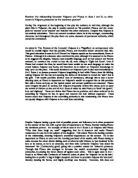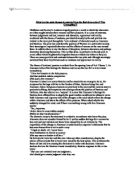Examine the relationship between Volpone and Mosca in Acts I and II of the Ben Jonson play "Volpone"; to what extent is Volpone presented as the dominant partner?
Examine the relationship between Volpone and Mosca in Acts I and II; to what extent is Volpone presented as the dominant partner?
During The Argument at the beginning of the play the audience is told that, although the play’s title is ‘Volpone’, the play is mostly centred on ‘his parasite’, Mosca, and the cross-plots he ‘weaves’ as he ‘assures’ and ‘deludes’ the other characters. Despite this, Volpone is not entirely submissive. There are several occasions where he is the stronger, commanding character, and throughout the play there are some elements of permanent authority, which cannot be overlooked.
As stated in ‘The Persons of the Comedy’, Volpone is a ‘Magnifico’, an entrepreneur who would be socially higher than his parasite, Mosca, and therefore better educated than him. This good education is seen in Act II Scene ii as Volpone speaks as the mountebank, Scoto of Mantua. Although it is unknown who contrived the plot, although it is assumed to be Mosca as he suggests the disguise, Volpone uses scientific language, such as ‘mal caduco’ and ‘hernia ventosa’, to convince the crowd to buy his oil, even calling in ‘Oglio del Scoto’. Even if Mosca had created the idea, he would have been unable to use such language to make the crowd believe Volpone was Scoto, and therefore he is reliant on Volpone’s knowledge to help carry out his plans. This social dominance on Volpone’s part is also seen immediately in Act I Scene i, as Jonson presents Volpone languishing in bed while Mosca does his bidding, waking Volpone for the day and opening the shrine at his behest to reveal the ‘saint’ that is his gold. This wealth provides another area of dominance, although this is also a factor affecting class, as Mosca is dependent on Volpone’s wealth to support him as this provides him with a home and pay, so the typical master and servant positions are assumed. Mosca never forgets his place in society, and Volpone frequently orders him about, such as upon the arrival of Voltore at the end of Act I Scene ii when he asks Mosca to ‘fetch’ his ‘gown’,’ furs, and nightcap’. These are duties that Mosca has to perform, and when ordered to do something by Volpone he has to agree and execute the task without argument. These factors mean that Volpone is the overriding authority in this relationship, and Mosca dare not openly disagree with Volpone as he could lose everything.

This is a preview of the whole essay
Teacher Reviews
Here's what a teacher thought of this essay
This is a promising essay, with some thoughtful analysis of these two main characters and their mutual dependence. The Introduction needs clearer aims, setting out a thesis to be discussed in the analysis. There is some promising further material in the bullet points but this would attract no marks in its present form; it needs to be expanded and fully supported with quotations and analysis. Sentence and paragraph structure are sound, with very few grammatical mistakes and adequate lexis. With development along the same lines, this essay could merit 4 or even 5 stars. 3 stars.







